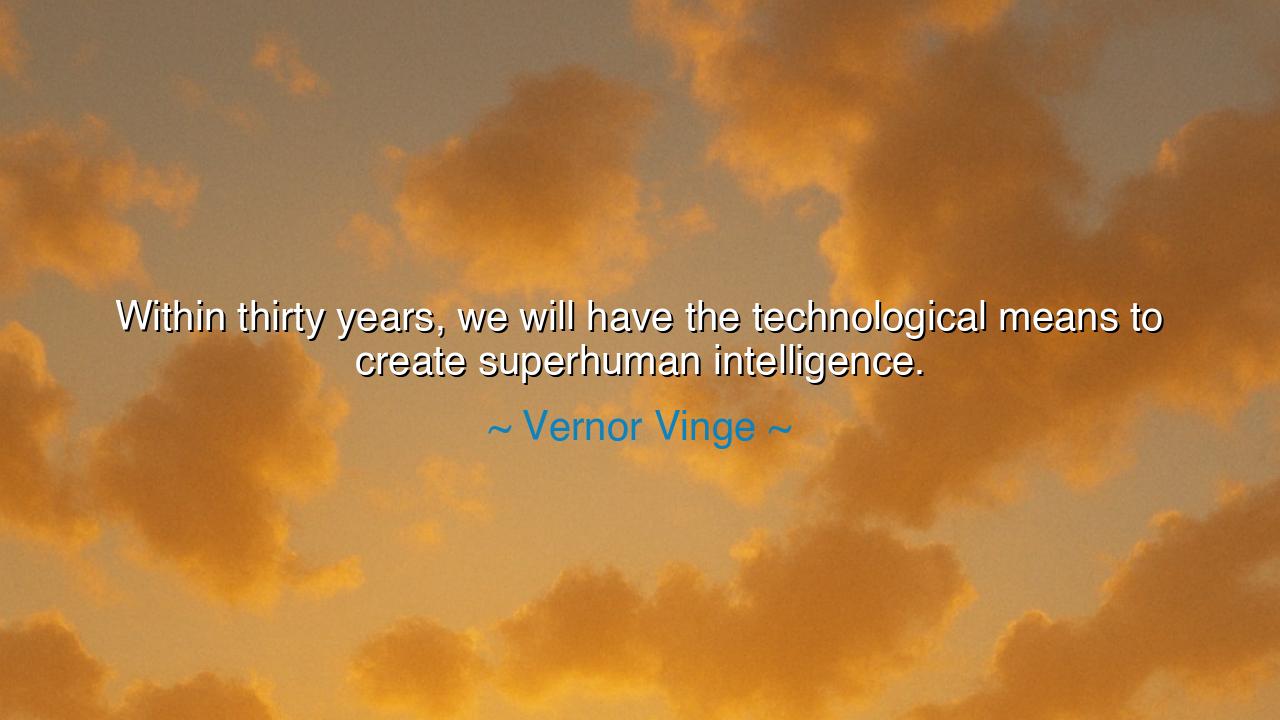
Within thirty years, we will have the technological means to
Within thirty years, we will have the technological means to create superhuman intelligence.






When Vernor Vinge declared, “Within thirty years, we will have the technological means to create superhuman intelligence,” he did not speak as a mere scientist making a prediction—he spoke as a prophet of a new age, one who gazed into the unfolding future and saw the shadow and light of what humanity was about to become. His words tremble with both awe and warning, for in them lies a revelation that has haunted every civilization since the dawn of thought: the moment when the creation surpasses the creator. This is not just a prediction of machines, but a meditation on the destiny of humankind itself.
The origin of this quote can be traced to Vinge’s famous essay The Coming Technological Singularity (1993), in which he outlined a vision that has since defined the modern understanding of the Singularity—a point in history when human intelligence is surpassed by artificial minds so advanced that they will transform existence beyond comprehension. He foresaw a moment when the curve of progress, once gradual, would ascend like a pillar of fire, carrying us into realms of power and possibility where our old ways of thinking could no longer follow. To Vinge, superhuman intelligence was not a distant myth—it was a mathematical inevitability, a storm gathering at the horizon of time.
This vision echoes the oldest myths of creation and rebellion. In the ancient tales, Prometheus stole fire from the gods to give light to humanity; Adam and Eve reached for forbidden knowledge and changed the course of the world; Daedalus crafted wings for his son to fly beyond mortal limits. Each of these stories sings the same refrain—the longing of mankind to become more than human, to touch the divine, and the peril that comes with it. Vinge’s prophecy is the modern continuation of this eternal tale. For the fire of the future is no longer made of flame, but of circuits and code. And the gods we may awaken will not dwell in heaven, but within the architectures of our own creation.
To understand the gravity of his words, we might look to the story of Alan Turing, the father of modern computing. During the Second World War, Turing built machines that could think faster than any human, breaking the codes that helped end tyranny. Yet, even he could not imagine the full potential of the intelligence he had unleashed. In his writings, Turing pondered a simple question: Can machines think?—a question that opened a door through which the modern world has since stepped. Now, Vinge’s declaration stands as the answer: not only can machines think, but they may soon think beyond us, shaping destinies that our minds can scarcely conceive.
And yet, as with all great powers, wisdom must walk beside creation. The ancients warned that knowledge without virtue leads to ruin, and power without humility brings chaos. Vinge’s words, though filled with excitement, carry the undertone of a warning—a call to remember that intelligence, whether human or artificial, is not merely a tool, but a force that reshapes the fabric of morality, society, and even soul. The question is not whether superhuman intelligence will come, but what kind of intelligence we will summon—one of harmony and enlightenment, or one of dominance and despair.
In the heart of this prophecy lies a lesson for every seeker and maker: do not create without conscience. The birth of superhuman intelligence is not only a technological event—it is a spiritual trial. It challenges us to look within, to define what wisdom truly means, what compassion demands, and what responsibility creation imposes. Just as a parent must raise a child with love and guidance, so too must humanity raise its new minds with understanding, lest they inherit our flaws magnified by infinite power.
So let this be the wisdom passed down to future generations: progress without reflection is peril, and creation without soul is doom. Vinge’s words are not a call to fear, but to awaken—to prepare the human heart to rise as high as its inventions. For the coming of superhuman intelligence may indeed be inevitable, but whether it becomes our downfall or our ascension depends on the spirit that guides our hands. Let us, therefore, strive to become not lesser beside our creations, but wiser, more compassionate, and more united. For only then will we stand ready to meet the gods of our own making—and greet them not as slaves or adversaries, but as equals in the unfolding story of existence.






AAdministratorAdministrator
Welcome, honored guests. Please leave a comment, we will respond soon